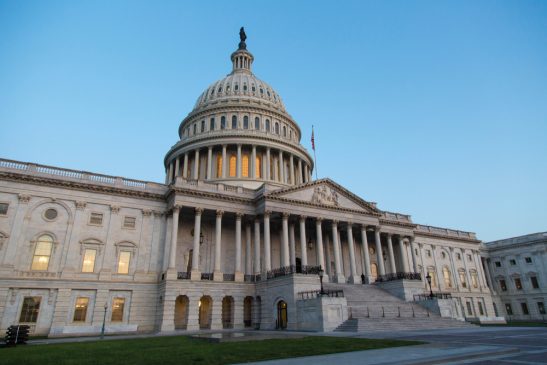A group of major players in the crypto and blockchain industry have joined forces to pay D.C. lobbyists to ensure that US lawmakers pass legislation that is friendly to the crypto and blockchain industry.
The group of fintech firms that are joining forces will be paying the lobbyists partially in crypto, and includes Ripple among other, smaller, startups. The announcement first came on Thursday, when the coalition announced that they would be retaining Klein/Johnson Group, a bipartisan lobbyist group that focuses in FinTech issues.
The group clearly feels threatened by the current climate surrounding the United States’ regulatory agencies, like the Securities and Exchange Commission (SEC), who have been moving to crackdown on ICOs and fraudulent cryptocurrency projects, treating them as though they are securities rather than commodities or special assets.
Currently, there is a divide within the US government as to how to best regulate the cryptocurrency industry, with major issues surrounding the definition of different types of cryptocurrencies, which largely fall into the categories of securities tokens, utility tokens, or commodities.
The new group is calling themselves the Securing America’s Internet of Value Coalition, and will be the main force driving and funding friendly legislation coming out of D.C.
While speaking about the new coalition, Ripple’s executive chairman, Chris Larsen, said:
“We understand this [cryptocurrency/blockchain] is really complicated, and there is a lot of misinformation out there. The good news is there is a lot of interest in this topic in D.C.”
The coalition will be paying the lobbyist firm $25,000 per month in addition to 10,000 XRP, which will be treated as a cash payment in all disclosures to federal lobbying firms.
Larsen said that the decision to pay the firm partially in cryptocurrency is strategic, as it gives them some skin in the game, making it profitable for them to best represent cryptocurrency (and more specifically XRP) in front of legislative authorities.
“It gives them some upside and gives them some risk. Hopefully it gives them a taste of the industry in a way that hits home,” Larsen said.
Confusion Surrounding Cryptocurrency Legislation and Designation
The confusion surrounding how to classify cryptocurrencies is mainly because they simply don’t fall under one regulatory umbrella, which makes it difficult to divide responsibilities amongst the US’s multiple regulatory agencies, including the SEC and the CFTC.
Recently, multiple US courts have also issued various rulings that add to the confusion, most recently with a federal judge stating that virtual currencies should be ruled as commodities. This ruling asserts that issues surrounding cryptocurrencies should be handled by the CFTC rather than the SEC, which is good news for the crypto industry.
Despite this ruling, another federal judge made a somewhat conflicting ruling in the past month, when he claimed that Initial Coin Offerings and the subsequent investments resulting from these offerings should be ruled under securities laws as set forth by the SEC.
The judge making this decision noted that:
“Congress’ purpose in enacting the securities laws was to regulate investments, in whatever form they are made and by whatever name they are called…”
Having well-spoken and convincing lobbyists in D.C. that could help produce friendly cryptocurrency legislation is positive for the entire market, as investors are increasingly keen on how regulatory authorities react to products like the Bitcoin ETF and upcoming cryptocurrency exchange, Bakkt.
Featured image from Shutterstock




